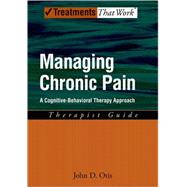
Note: Supplemental materials are not guaranteed with Rental or Used book purchases.
Purchase Benefits
What is included with this book?
| Introductory Information for Therapists | p. 1 |
| The Pain Evaluation | p. 13 |
| Session 1: Education on Chronic Pain | p. 21 |
| Session 2: Theories of Pain and Diaphragmatic Breathing | p. 29 |
| Session 3: Progressive Muscle Relaxation and Visual Imagery | p. 39 |
| Session 4: Automatic Thoughts and Pain | p. 49 |
| Session 5: Cognitive Restructuring | p. 59 |
| Session 6: Stress Management | p. 65 |
| Session 7: Time-Based Pacing | p. 73 |
| Session 8: Pleasant Activity Scheduling | p. 79 |
| Session 9: Anger Management | p. 83 |
| Session 10: Sleep Hygiene | p. 91 |
| Session 11: Relapse Prevention and Flare-up Planning | p. 97 |
| Pain Interview | p. 103 |
| Goal Setting Worksheets | p. 108 |
| References | p. 109 |
| About the Author | p. 113 |
| Table of Contents provided by Ingram. All Rights Reserved. |
The New copy of this book will include any supplemental materials advertised. Please check the title of the book to determine if it should include any access cards, study guides, lab manuals, CDs, etc.
The Used, Rental and eBook copies of this book are not guaranteed to include any supplemental materials. Typically, only the book itself is included. This is true even if the title states it includes any access cards, study guides, lab manuals, CDs, etc.